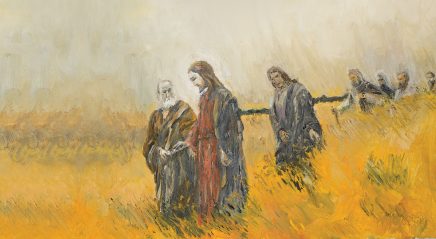Lectionary for Feb. 4, 2023
Fifth Sunday after Epiphany
Isaiah 40:21-31; Psalm 147:1-11, 20c;
1 Corinthians 9:16-23; Mark 1:29-39
One of my favorite features of the New Testament is the intentional callbacks to earlier episodes in Scripture. All four Gospels speak about John’s baptismal ministry, referencing the language of Isaiah 40:3—a voice cries out in the wilderness to prepare the way of the Lord. The notion of the Lord causing a way to be prepared in the wilderness in Isaiah is an intentional callback to the foundational story of the Hebrew Bible—the redemption of the people from Egypt and their wilderness journey to the promised land. The Gospel writers—by the Spirit’s guidance—intentionally tied Jesus’ life, ministry, death and resurrection to the story of God and God’s people inherited over the generations. Jesus’ disciples knew/know that the story of God and the Beloved Community is ongoing and that God’s acts of salvation and rescue echo throughout the generations.
In this week’s reading from the Gospel of Mark, Jesus’ actions at the beginning of his ministry echo the cosmic and salvific works of God in ages past.
In prophetic writing directed toward Israelites and Judahites returning to their lands after a long sojourn, God—through the writer—addresses the people to remind them of just who their God is. The author asks repeated questions—“Do you not know? Have you not heard? Has it not been declared to you …? Have you not understood …?” What follows is a review of just who God is and what God’s priorities are.
The hearer is reminded that God is both creator and loving judge. God creates the heavenly hosts and calls them all by name. Now, some Bible translations add the word “stars” to Isaiah in verse 26, but that isn’t in the Hebrew text. Instead, the cosmology of Isaiah is that the heavenly bodies (stars, comets and planets) are both physical objects and personal beings. This personal identification of celestial bodies is common across cultures and fairly consistent throughout Scripture (Isaiah 34:4, 45:12; Jeremiah 33:22; Psalm 33:6, 1 Enoch 18:12-14). The psalm for this week does use the word “star” but carries a similar message of God’s knowledge. Accordingly, God is not just portrayed as an enthusiastic astronomer with a great memory, but as the God who created, named and has personal knowledge of all celestial/spiritual beings.
The author asks repeated questions—“Do you not know? Have you not heard? Has it not been declared to you …? Have you not understood …?”
But God isn’t just the master of the spiritual world. God is a lover of justice and restoration in the material world as well. Rather than wait for cases to be brought to a docket, God is the kind of judge who actively works in the world. God insists that justice due to the people isn’t hidden from divine notice (Isaiah 40:27). God brings rulers to nothing and makes earthly judges void (23), and gives strength to the weary and increases the power of the one who lacks (29). The psalmist proclaims that God gathers the outcasts of Israel, heals the brokenhearted, binds up wounds, supports the afflicted and brings the wicked to the ground (Psalm 147:2-3, 6). God has always been in the habit of comforting the afflicted and afflicting the comfortable.
Near the beginning of the Gospel of Mark, Jesus’ ministry is cast in light of God’s ongoing ministry among the Holy Community. Jesus acts as a loving judge and demonstrates power over—and knowledge of—all spiritual beings. He interceded among the people, healing the ill, releasing people from demons and raising up Peter’s mother-in-law who was laid low by a fever. Jesus set free those bound by infirmity—whether medical or spiritual, echoing God’s emancipatory work.
Jesus was just one of many miracle workers and healers during his earthly lifetime. However, he was absolutely singular in his personhood as God’s unique son. Jesus used the divine knowledge of all celestial and spiritual beings that Isaiah and the psalmist described to powerfully and effectively order unclean spirits to cease tormenting their human prisoners. The devils knew Jesus’ name and his identity as the incarnate son. But Jesus wouldn’t let the demons disclose who he was/is before he could induct followers into the Christological mystery as he chose.
As we continue our time in this year focusing on the Gospel of Mark, we should pay attention to all that the author is saying about Jesus. Jesus heals and exorcises, not as a stand-alone ministry but as a continuation of the material justice and cosmic creation work that God has always been doing.








